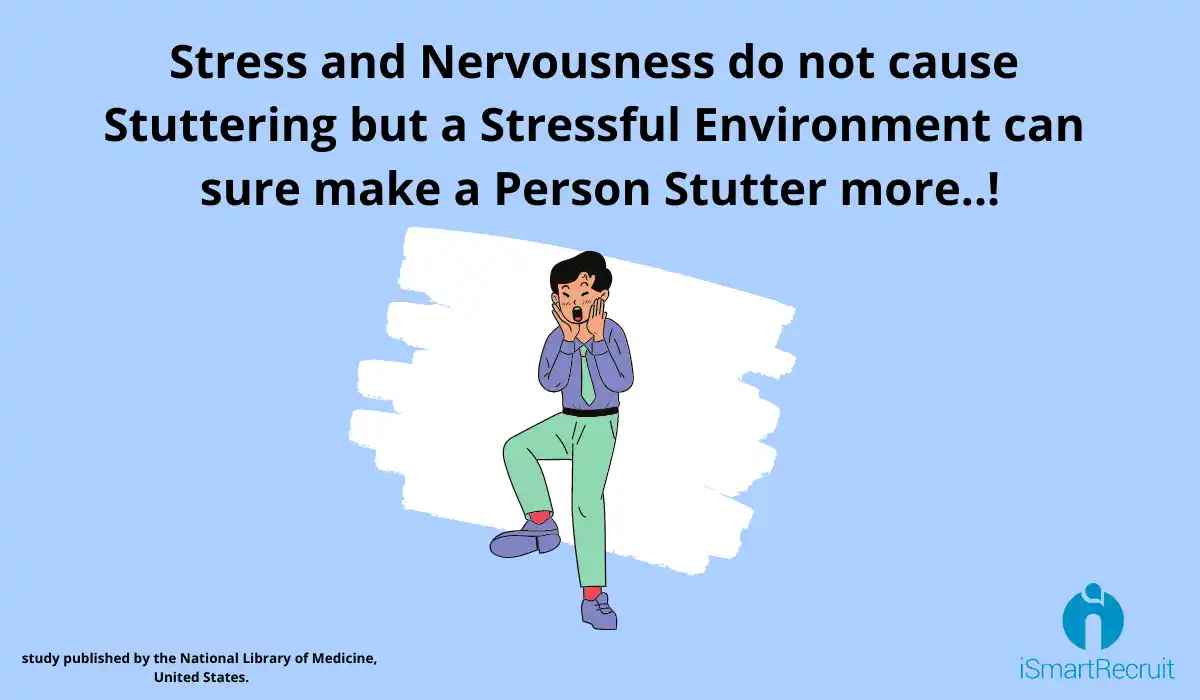TL;DR
- People who stutter (PWS) often have strong work ethics and can be excellent employees.
- Stuttering does not reflect intelligence; many stutterers have above-average IQs and great communication skills.
- Recruiters should focus on content over delivery during interviews and practice patience with stuttering candidates.
- Avoid telling candidates to relax or suggesting alternative roles based on stuttering, as this can be patronising or unlawful.
- Employers should assess if stuttering candidates can meet job communication requirements respectfully and without bias.
- It may be illegal to ask about disabilities directly; instead, ask about ability to perform job duties.
Nearly 3 million Americans stutter. More than 70+ million people stutter worldwide. People who stutter (PWS) can make good employees as they often try to compensate for their speech disfluencies by working harder in the workplace.
According to Barry Guitar, professor of speech-language pathology at the University of Vermont, PWS tend to have a temperament that's 'perfectionist.' A worldwide authority on the subject, Dr. Guitar has dealt with stuttering himself.
Contrary to popular belief, PWS are not guarded, nervous, anxious, or shy. Stuttering behaviors may at times be similar to the behaviors of non-stutterers who experience such emotions; however, stuttering individuals exhibit a full-range of personality traits as fluent speakers.
Stress and nervousness do not cause stuttering but a stressful environment can sure make a person stutter more, according to a study published by the National Library of Medicine, United States.
A speech impediment does not indicate a lack of intelligence. According to Psychcentral.com, the average stutterer's IQ (Intelligence Quotient) is 14 points more than the national average. A study conducted on 1,619 children in Australia in 2013 had concluded that stuttering children are more intelligent.
It is also worth mentioning here that many individuals who stutter have excellent communication skills. After all, communication skills are not limited to being fluent. Many individuals also practice speech therapy exercises for stuttering at home or avail of professional speech therapy and are qualified for positions that require them to deal with customers or the public on a daily basis.
A good communicator needs to be thoughtful & diplomatic and have the ability to come up with interesting and meaningful things to say. Having struggled with speech disfluencies all their lives, stutterers develop such people skills early on. There are many other benefits employers stand to accrue, should they be interested in hiring candidates who stutter.
Therefore, when employers, recruiters, or HR managers dismiss candidates for employment due to a speech disorder, they may be losing out on an opportunity to recruit a dedicated employee.
Interacting With a Stuttering Candidate
Recruiters need to be patient and practice active listening while interacting with a stuttering candidate.
Relax and communicate with such candidates as you normally would with other, more fluent candidates.
Instead of focusing on how a person stutters (i.e. the delivery of information) or their body language, pay attention to what they are saying (i.e. the content of communication).
Trying to fill in words or completing a sentence when they get stuck is a bad idea. It only makes them more conscious of their speech disfluencies.
Instead, try to act as natural as possible and maintain conversational eye-contact. When a candidate gets stuck on a word, wait for them to finish a sentence.
A telephonic interview may not be the best way to gauge a stutterer's communication skills. If possible, consider offering such candidates a chance to appear for a personal interview or a video interview.
Don't Tell a Stuttering Candidate to Relax
When a candidate gets stuck during a face-to-face interview, you may feel like telling them to take a deep breath and relax. After all, this is what you'd tell anyone who appears nervous or shy during a job interview.
In the case of most candidates, this can surely help ease their nerves.
However, for a candidate who has been struggling with stuttering since childhood, even basic advice such as telling them to relax or take a deep breath can sound demeaning.
When remarks from an interviewer sound patronizing to a stuttering candidate, they don't feel confident in demonstrating their skills and knowledge to their full potential.
There are better ways to interview candidates who appear nervous.
If a candidate voluntarily informs you about their speech disfluencies, a polite remark such as, "Thank you for telling me about that. It will put us both at ease" can help allay any discomfort.
See if the Candidate Meets Communication Requirements Relevant to the Job
Don't hesitate to ask if a stuttering candidate is prepared to fulfill communication requirements relevant to the job.
If the position at hand requires speaking with customers, whether telephonically or at the place of business, it's okay to ask how the job applicant feels about communicating.
Just try to ask respectfully without sounding as if you are casting aspersions on their abilities.
Many PWS can handle the telephone, talk to customers at the place of business, or communicate well with co-workers and clients. However, some people who stutter are not so comfortable working in roles that require them to talk frequently.
So, it's fair on part of recruiters to put forward that question. Employers or recruiters should also know what it means to have a stuttering worker in the workforce.
An offer of employment should be made according to a candidate's capabilities and knowledge sans any bias.
Don't Tell a Stutterer They Should Apply For a Different Job Role
First, it's wrong to tell a person struggling with a speech disorder (or any other limitation for that matter) that they should consider applying for a different position. Stuttering does not define a person or limit their intelligence, knowledge, or talent.
Second, it may be unlawful in your country to tell a stutterer that their speech impediment makes them unfit for any given position. With such well-meaning but ill-informed suggestions, you may be treading on dangerous legal ground.
In the United States, for instance, stuttering may be classified as a disability under the Americans With Disabilities (ADA) act if it substantially limits a person's ability to communicate.
The ADA does not specify a list of medical conditions that qualify as disabilities. It relies on a general definition of disability.
Can Recruiters Ask Someone About Their Stuttering?
No. It may be illegal for an employer, HR manager, or recruiter to ask a job applicant about the existence of a disability or its severity.
You may, however, ask about the candidate's ability to perform various duties they are reasonably expected to discharge.
Final Words About Handling Candidates Who Stutter
Almost 70% of PWS feel stuttering reduces their chances of getting hired or promoted. Recruiters can bring about a change in how stuttering individuals can enter, grow, and realize their full potential in various industry sectors.
FAQs - Frequently Asked Questions
Can stuttering affect a person's intelligence or job performance?
Stuttering does not reflect a person’s intelligence or skills. Many individuals who stutter are highly capable and often develop excellent communication and people skills, making them valuable employees in various roles.
How should recruiters handle interviews with candidates who stutter?
Recruiters should remain patient and focus on the content of the candidate’s communication rather than their speech delivery. Avoid finishing their sentences and maintain natural eye contact to make them comfortable.
Is it appropriate to ask candidates about their stuttering during recruitment?
It may be illegal to ask about disabilities directly. Instead, recruiters can ask if the candidate can perform the essential duties of the job, respecting their privacy and focusing on abilities.
Should employers suggest alternative job roles to candidates who stutter?
No, stuttering does not limit a person’s capabilities. Suggesting alternative roles may be unlawful and discourages talented candidates. Recruitment decisions should be based on skills and knowledge.














.webp)


